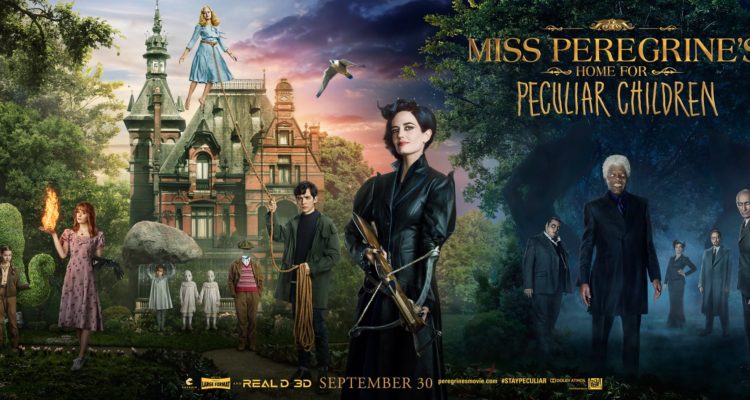Let me begin by saying that I have a prejudice against fantasy. Monsters, goblins, things-that-go-bump-in-the-night are excruciating to me. I fear I’m exactly the kind of adult Peter Pan never wanted to become: one that doesn’t believe in magic.
However, I was enthralled with Ransom Riggs’ novel, Miss Peregrine’s Home for Peculiar Children. Protagonist Jacob’s narration of his life Before and After his journey to the children’s home of his grandfather’s lore brought this cynic along for the ride. Jacob is a misanthropic teenager in Florida—a skeptic who, out of a desire to better understand his beloved grandpa and deal with his own shortcomings, seeks the truth of his grandpa’s fantastic childhood among orphans with extraordinary abilities.
In the novel I cared about Jacob because I knew him. I was touched by his special bond to his grandfather, especially in light of his shallow relationship with his own parents. I was also invested in the mystery of his grandpa’s last words as he lay dying. Were they the ramblings of a dementia patient grappling with death or desperate final instructions? The enigma kept me turning pages, as did Jacob’s struggle to believe in the monsters his grandpa warned him about. The timing of Riggs’ revelations was pitch perfect.
I’ll admit that some of the rules of this world, in addition to what monsters want and how they aim to achieve it, got a little confusing. But by the time we get to the nuts and bolts of how Peculiars function or how time loops are possible, I no longer cared if it made 100% sense. I was invested. I cared deeply for Jacob. And I wanted to know what happened to the other children.
Tim Burton’s movie by the same name is a different story. I was expecting good things because if ever there was a novel begging to be a Tim Burton movie, this one about children with special powers fighting off ogres is it. And, who doesn’t enjoy being an armchair critic? In fact, I can’t wait to do just that with the next YA books-to-movies coming out. It’s always a thrill to see the visual elements of a book come to life on the silver screen.
In this, I was not disappointed. Everything in the movie (save the monsters) looked exactly as I had imagined. For those of you unfamiliar, it’s not only Riggs’ writing skills that draw a picture for readers—he also reprints vintage photographs to illustrate the story. The set and effects, costuming (especially Emma), and the underwater scenes are all spectacular. They’re why people go to a cinema instead of waiting for the DVD.
The story adaptation, on the other hand, was uneven at best. It oddly starts off slow. I never had a sense of who Jacob was other than a generic unpopular kid. His grandfather is killed in a vicious way, but I didn’t know what kind of relationship they had, so it didn’t have the emotional impact it could have. This mutes the grandpa’s mysterious deathbed riddle that spurs all the action in the book. The elements of the novel that gripped me were flimsy in the movie, which lowered the stakes in general.
When Jacob finally arrives at the home for peculiar children, he handles time travel and the existence of extraordinary (even magical) skills like a champ. A beautiful girl that floats away without her lead shoes? Cool. A boy who creepily animates clay dolls with animal hearts? Sweet. Bird headmistresses create time loops to keep monsters from eating the eyeballs of their wards? No problem.
And here, folks, is where this doubter was no longer able to suspend disbelief. Things get confusing fast, and because I wasn’t fully anchored in the story, I was cast adrift. I focused on the flaws both in story and in directorial choices. Why, when Jacob finally hears reference to his grandpa’s last words does he have no reaction? How can a ship, sunk for centuries, float without repairing the hull? Sloppiness bursts the fragile bubble of fantasy.
Burton’s Miss Peregrine takes license with the story line too, which is not something I personally find problematic. It’s hard to exactly match the intricacies of a novel’s plot when distillation for time and cinematic cohesion are necessary. That said, those who require fidelity to the novel will notice changes.
Despite these peccadilloes, if you’ve read the book, you gotta go to the movie. It’s worth seeing this magical world come to life. However, for those of you like me, for whom tentacle-tongued monsters are generally off-putting, I’d try the book first. That ride could convert even the stodgiest into believers.
Q: What did you think? Did you like the movie? Why or why not?


